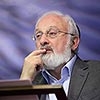 Question from Facebook: The central place in all religions is the concept of God. What does God mean in Kabbalah?
Question from Facebook: The central place in all religions is the concept of God. What does God mean in Kabbalah?
Answer: God in Kabbalah means the general force of nature, except for it, nothing exists.
In itself, this is an abstract concept in relation to a person, and we cannot speak about something that exists outside our perception. No one has ever felt it. This state of the Creator, which is not in relative to us when this upper force exists by itself, in no way can be perceived by us, and therefore, this force is called Atzmuto, meaning He by Himself is Himself.
Everything that we attain and what is possible for us to attain are the actions of the upper force in relation to us. The wisdom of Kabbalah deals with revealing these actions in relation to a person.
We call this upper force the Creator because He created man, He created all the qualities in a person, within which we feel our world and can explore through our senses the Creator Himself, the one who created us. We can explore why He created us with these qualities, with these limitations or, conversely, with these abilities, and what the Creator wants from us.
Developing in this direction, we begin to attain Him, meaning the Creator. Not Atzmuto, not Him by Himself, but exactly the Creator in relation to us. In this way, we explore His actions, how He created our world and all other worlds, which is a certain system of connections between Him and us. Such a system of connections of gradually descending degrees is called worlds. This system affects us.
By studying these worlds, we study the Creator, we study ourselves, we understand in what states we are in connection with Him. And we can change our behavior and our actions in accordance with this in order to raise ourselves to higher connections, to be connected directly with the Creator, literally face to face.
In other words, we can see what kind of reactions our actions produce in Him and, conversely, what reactions His actions produce in us. We can reach an absolutely complete, open two-way connection.
When we begin to attain this opportunity, to reveal and achieve it gradually, we naturally change our behavior in accordance with what we reveal, and we enter a completely different stage of our development where we begin to change into similarity with the Creator. At the same time, our world and we ourselves are change radically and our state becomes more and more reliable, convenient, correct, and true.
Question: Who do I call God if I study Kabbalah?
Answer: I call God the general force of nature. It is called Elokim, which in gematria (the numeric value of the word) is equal to Teva (Nature). The entirety of nature that I reveal, everything that affects me externally, I call the Creator, and everything that is inside of me, I call the derivatives of the Creator.
This is the whole purpose of our work, study, and all sorts of actions—to make an absolute similarity between ourselves and the Creator in desires, intentions, and actions and to reach a completely harmonious connection.
Just as I discover that all the qualities of the Creator are bestowal and love, so I raise myself to these qualities. All this is perceived through feelings; after all, a person is a sensory creature. The mind is given to him in order to control these feelings and form them into similarity to the Creator.
We are created only for this. However, in order to come to this decision, conclusion, and action, we must go through a very long stage of historical development: inanimate, vegetative, animate, and speaking.
Now we have come to the very last stage of human development. We just need to reveal the Creator and make ourselves similar to Him. Then we will be called “Man” (Adam, which means similar).
[215232]
From KabTV’s “News with Michael Laitman” 8/31/17
[215232]
From KabTV’s “News with Michael Laitman” 8/31/17

No comments:
Post a Comment